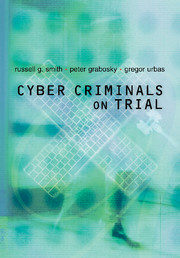Book contents
- Frontmatter
- Contents
- List of figures and tables
- Acknowledgments
- Preface
- Abbreviations
- Currency exchange rates
- Chapter One Introduction
- Chapter Two Defining and Measuring Cyber Crime
- Chapter Three The Prosecutor as Gatekeeper
- Chapter Four Cross-Border Issues
- Chapter Five Strategies of Cyber Crime Litigation
- Chapter Six The Quest for Harmonisation of Cyber Crime Laws
- Chapter Seven Judicial Punishment in Cyberspace
- Chapter Eight Sentencing Cyber Criminals
- Chapter Nine Conclusions
- References
- Appendix A Case Summaries 1972–2003
- Appendix B Selected Legislative Summaries
- Index
Chapter Four - Cross-Border Issues
Published online by Cambridge University Press: 22 September 2009
- Frontmatter
- Contents
- List of figures and tables
- Acknowledgments
- Preface
- Abbreviations
- Currency exchange rates
- Chapter One Introduction
- Chapter Two Defining and Measuring Cyber Crime
- Chapter Three The Prosecutor as Gatekeeper
- Chapter Four Cross-Border Issues
- Chapter Five Strategies of Cyber Crime Litigation
- Chapter Six The Quest for Harmonisation of Cyber Crime Laws
- Chapter Seven Judicial Punishment in Cyberspace
- Chapter Eight Sentencing Cyber Criminals
- Chapter Nine Conclusions
- References
- Appendix A Case Summaries 1972–2003
- Appendix B Selected Legislative Summaries
- Index
Summary
Introduction
One of the most important characteristics distinguishing computer-related crime from ‘terrestrial crime’ is the matter of jurisdiction. The global nature of cyberspace makes it much easier than ever before for a person sitting on one side of the world to commit a crime on the other side. The offending activity (whether it involves the sending of illicit images of children, malicious code, or fraudulent stock tips) can pass through numerous sovereign nations at the speed of light on the way to the target. Which of these nations can prosecute such cases: the jurisdiction where the activity was initiated, the place where it had its effect (that is, where the loss or damage was sustained), or a nation through which the offending communication may have passed on its path from origin to destination?
It is up to the prosecutor to decide whether a case should be prosecuted within his or her jurisdiction. It is up to the judge whether the court has jurisdiction to hear the case, on the basis of general statutory rules or the specific substantive offence with which the accused has been charged. Traditionally, jurisdiction required a substantial link with the territory in which the matter would be heard. Merely having been passed through by a communication en route from Country A to Country C was not always sufficient to achieve jurisdiction in Country B. A good deal of energy is now being devoted to expanding jurisdiction, as we shall soon see.
- Type
- Chapter
- Information
- Cyber Criminals on Trial , pp. 48 - 60Publisher: Cambridge University PressPrint publication year: 2004
- 1
- Cited by



